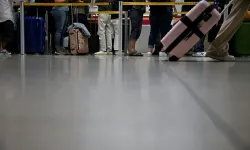Specialist doctors, general practitioners and assistant doctors, who have been in dispute with the government over salary increases for a long time in the UK, went on strike together for the second time.
Approximately 24 thousand specialist doctors and 61 thousand general practitioners and assistant physicians in the country started a 3-day work stoppage.
Only emergency services will be provided during the doctors' work stoppage.
UK National Health System (NHS) officials warned that "routine services in hospitals may almost come to a standstill during the strike".
British Health Minister Steve Barclay called on doctors to end the strike.
Specialists and general practitioners went on strike together for the first time on September 20, but this collective work stoppage lasted 24 hours.
THE NUMBER OF PEOPLE WAITING HAS RISEN TO 7 MILLION
Specialist doctors demanding a wage increase above inflation are going on strike for the 4th time this year, while general practitioners and assistant doctors demanding a 35 percent wage increase are going on strike for the 7th time.
The doctors' strike in England is among the reasons why the number of people waiting for treatment in hospitals has risen to an all-time high of about 7.7 million.
PRIME MINISTER HELD STRIKERS RESPONSIBLE
British Prime Minister Rishi Sunak said in August that the government would not be able to meet its target to reduce waiting lists in hospitals, claiming that the progress made had been disrupted by strikes by health workers.
Sunak blamed the strikes and the Covid-19 outbreak for the increase in the number of people waiting for treatment in hospitals.
The number of people waiting for treatment in hospitals in England rose to 7 million last year.
Doctors on strike!
Tens of thousands of doctors in the UK began a 3-day work stoppage.
Editor: Albert Owen
Trending news

Snoop Dogg to carry the Olympic torch

Lily James Expresses Admiration for Hailey Bieber’s Rhode Skincare Line

Taylor Tomlinson Will Explore Her Faith and Sexuality on Tour!

'Alien mummy' in Peru raises eyebrows

Scandal in the heart of Europe: Child abuse in a church!

Kamala Harris’ Running Mate: Here’s Who Could Be Her VP After Biden Drops Out And Endorses Her







